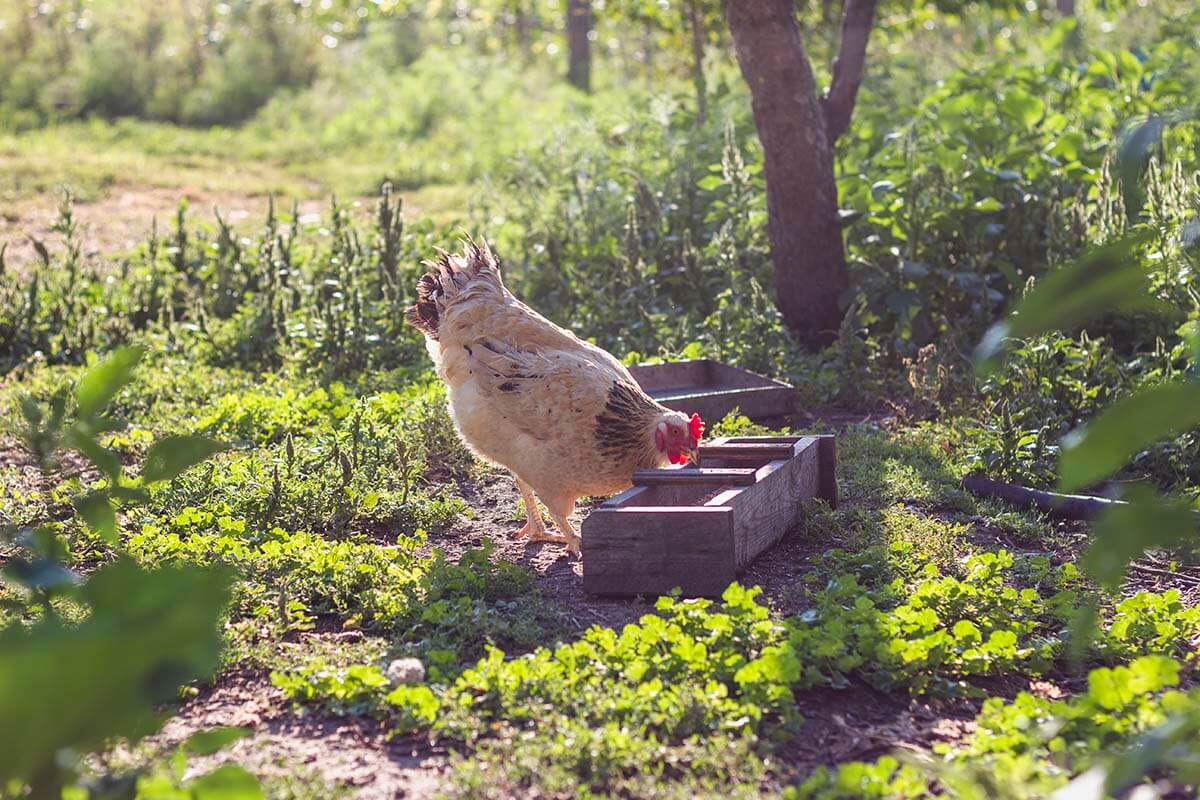Garden Pest Control with Chickens: A Practical Guide
Yesterday I found dozens of Japanese beetles on my tomatoes. Today? My six hens ate them for breakfast. That's chickens for pest control in action.
If you're tired of spraying chemicals or picking bugs by hand, chickens might be your answer. They work cheap, never complain, and turn pests into eggs. Let me show you how this natural pest control actually works.
What Chickens Eat in Your Garden
One chicken can debug about 120 square feet per week. They're not picky either when it comes to garden pest control.
They love: Japanese beetles, grasshoppers, cabbage worms, squash bugs, grubs, fly larvae, most caterpillars
They won't touch: Stink bugs (too smelly), adult slugs (too slimy), some tomato hornworms
The problem: Chickens can't tell good bugs from bad. They'll eat earthworms and ladybugs just as happily as pests. That's the trade-off with using chickens for pest control.
When to Let Chickens In

Spring (Before Planting): Let your backyard chickens work empty beds for 1-2 weeks. They'll dig up overwintering pests and eat weed seeds. Just watch out - they can dig 6-inch holes when they're really into it.
Summer (Growing Season): Only let them in for one hour before sunset. Your free-range chickens will hunt bugs but won't have time to discover your ripe tomatoes. Or stay with them and redirect when they head for the lettuce.
Fall (After Harvest): This is when chickens eat garden pests most effectively. Let them clean up everything - dropped fruit, old plants, next year's pest eggs. Your garden will be cleaner than you could ever make it by hand.
Quick Reference
Pest Control Ratings
| Pest | Success Rate |
|---|---|
| Japanese Beetles | Excellent |
| Grasshoppers | Excellent |
| Small Slugs | Good |
| Aphids | Poor |
| Squash Bugs | Very Good |
Year-Round Garden Management
Winter chickens still help with pest management. They'll eat bug-infested stored produce and clean up old stems where aphids overwinter. Their manure keeps composting even in cold weather.
Many gardeners extend their growing season indoors during winter. While chickens handle outdoor cleanup and pest control, you can start seedlings under grow lights in your basement or spare room. LED grow lights have made indoor seed starting more affordable and energy-efficient. By the time spring arrives, you'll have strong seedlings ready to transplant, and your chickens will have prepared the beds by eating overwintering pests.
For those with greenhouses or cold frames, chickens patrol the perimeter, catching pests trying to get in. Some gardeners even use supplemental lighting in their greenhouses to extend daylight hours for winter growing, while chickens work the surrounding areas. This combination of protected growing spaces with grow lights and natural pest control from chickens creates a productive year-round system.
Real Numbers, Real Results

Let's be honest about chickens for garden pest control:
- 3-4 chickens can reduce pests by 60-70% in a 500 sq ft garden
- You'll still need other methods for aphids and spider mites
- The eggs make up for any damage they cause
- Start with 2-3 hens if you're new to backyard chickens pest management
Common Problems Solved
"My chickens eat plants, not bugs" - Feed them less. Hungry chickens hunt more pests.
"They're digging dust baths in my beds" - Give them a sandbox with wood ash. They'll use that instead.
"They won't eat slugs" - Get ducks. Ducks love slugs and are gentler on plants.
Plants That Are Toxic to Chickens
Keep your free-range chickens away from:
- Potato and tomato leaves
- Rhubarb leaves
- Avocado pits
- Raw dried beans
Fence these off completely for safe eco-friendly pest control.
FAQs
Will 2-3 chickens really help with pest control? Yes. Even two chickens make a difference in garden pest management, especially in the off-season.
How do I protect newly planted seeds? Cover with bird netting until seedlings are 3-4 inches tall.
Can chickens replace all pesticides? No, but you'll use 70% less chemicals with this organic pest control method.
What about small urban gardens? Use bantam chickens with a moveable chicken tractor. Many cities allow a few hens.
Do chickens work for fruit tree pests? Perfect. They excel at orchard pest control, eating dropped fruit with larvae and catching beetles climbing trunks.
Seasonal Schedule for Chickens
| Season | Access | Duration |
|---|---|---|
| Early Spring | Full access | All day (before planting) |
| Summer | Supervised | 1 hour at sunset |
| Fall | Full access | Unlimited (after harvest) |
| Winter | Limited | Around structures only |
The Bottom Line
Chickens for pest control aren't perfect. They're messy and will eat your lettuce if you let them. But they're also the best natural pest control you can get.
Start with a few hens. Give them an hour in one garden bed. See what they eat, what they ignore. Most gardeners using chickens in the garden can't imagine going back once they figure out the rhythm.
This weekend, try it. One hour, one bed, watch what happens. A few pecked tomatoes is worth chemical-free pest control and fresh eggs.


